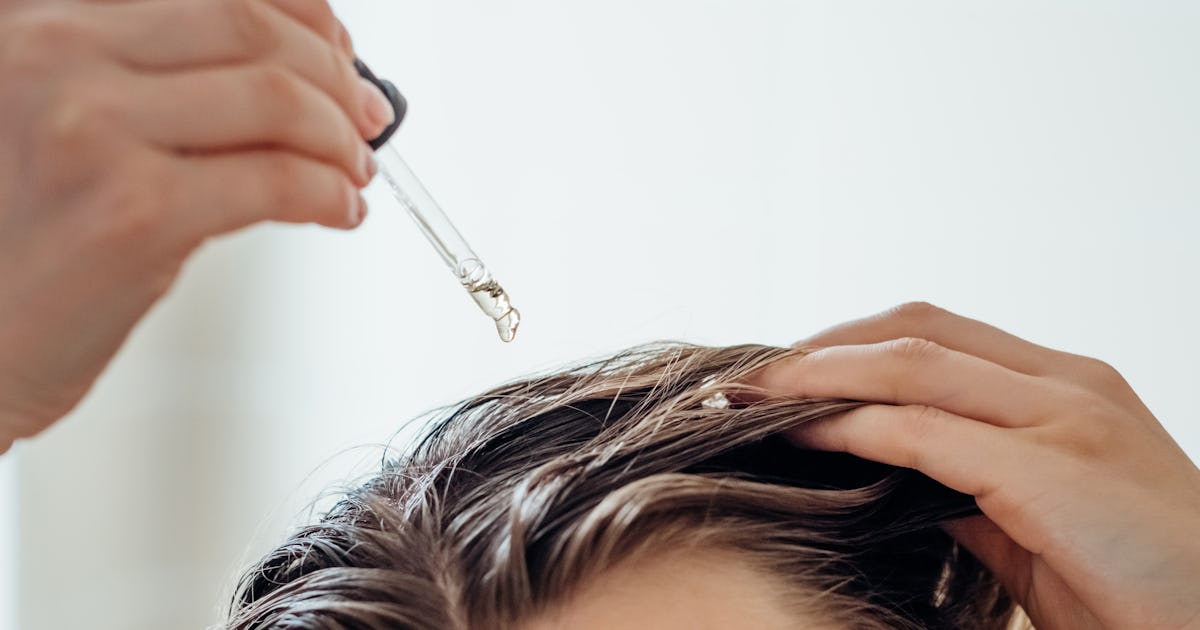
If you’ve noticed your hair is thinning, it’s natural to wonder what supplements help with hair loss, or if a little rosemary oil massaged into your scalp could really make the baby hairs begin to sprout. There’s certainly no shortage of influencers online hocking powders, pills, and tinctures of all sorts and claiming they were finally *the thing* to make their hair thick and luscious. (It’s definitely not the filters or the glam teams, if that’s what you were thinking.) So, what do dermatologists have to say about the best ways to regrow thinning hair?
Real talk: Does rosemary oil help hair growth?
There are countless videos online of people using rosemary oil a few times a week, massaging it into their scalps to stimulate new hair growth, some with millions of likes and views. There is actually one study — albeit a small one of only 100 people — that found that participants who used 2% minoxidil (generic Rogaine) and rosemary oil both had a significant, comparable increase in new hair growth after six months. That said, it’s possible the act of massaging in either product is what really stimulated all those new hairs into sprouting.
“Rosemary oil has shown to be equivalent to the use of 2% minoxidil topically in one study of 100 people,” says Dr. Brooke Jeffy, a board-certified dermatologist practicing in Arizona and Kentucky. “Minoxidil 5% has been shown to be more effective over 2%, but I am not aware of any studies comparing rosemary oil to the 5%. I think scalp massage is definitely a simple, reasonable treatment knowing that circulation stimulates hair growth, but there are certainly no large studies supporting that.”
It could also be that any oil would do the trick, and rosemary oil specifically isn’t some magic potion. “Hair oils do not directly cause hair growth but, rather, improve scalp conditions that may improve the health of your scalp skin and hair follicles. Hair oils repair dry, damaged hair by restoring moisture, providing important vitamins and nutrients, and limiting shedding and breakage,” says Dr. Brendan Camp, M.D., board-certified dermatologist at MDCS Dermatology in New York City.
If you want to use an evidence-based product to grow more hair (one with a large body of research behind it), both Jeffy and Camp stand by minoxidil, a.k.a. Rogaine, saying that clinical studies have shown it slows shedding and stimulates growth.
Can supplements actually help with hair loss?
If you’re anything like me, you’ll lose it if you see one more lady mix a scoop of green dust into a glass of water and proclaim how much hair she grew from taking it consistently. There are some people for whom vitamins and supplements are the key to hair regrowth, but for the masses, it’s just not going to do much.
“Hair loss supplements can be effective in patients with known nutritional or vitamin deficiencies. For example, low iron and vitamin D have been associated with hair loss. But their efficacy in promoting hair growth in people who have normal levels of vitamins and minerals is questionable; many of the studies promoting these products are conducted by the manufacturers themselves,” says Camp.
Jeffy seconds this, saying any studies about specific supplements’ effectiveness tend to be small and company-sponsored, meaning their results aren’t the most reliable. Even when it comes to vitamin E or hair, skin, and nail vitamins, she’s “not convinced” they’re enough to reverse hair loss. If you really want to slow hair loss and regrow sparse areas on your scalp, you’re probably going to need a derm’s guidance.
“Hair loss has many causes and can be incredibly complicated. I think it is key to see a doctor early on to determine what type of loss you are experiencing. There are also effective medical therapies that tend to be a lot less costly than many of the products you see pushed by influencers and supplement companies,” Jeffy says.
This article was originally published on scarymommy.com.

